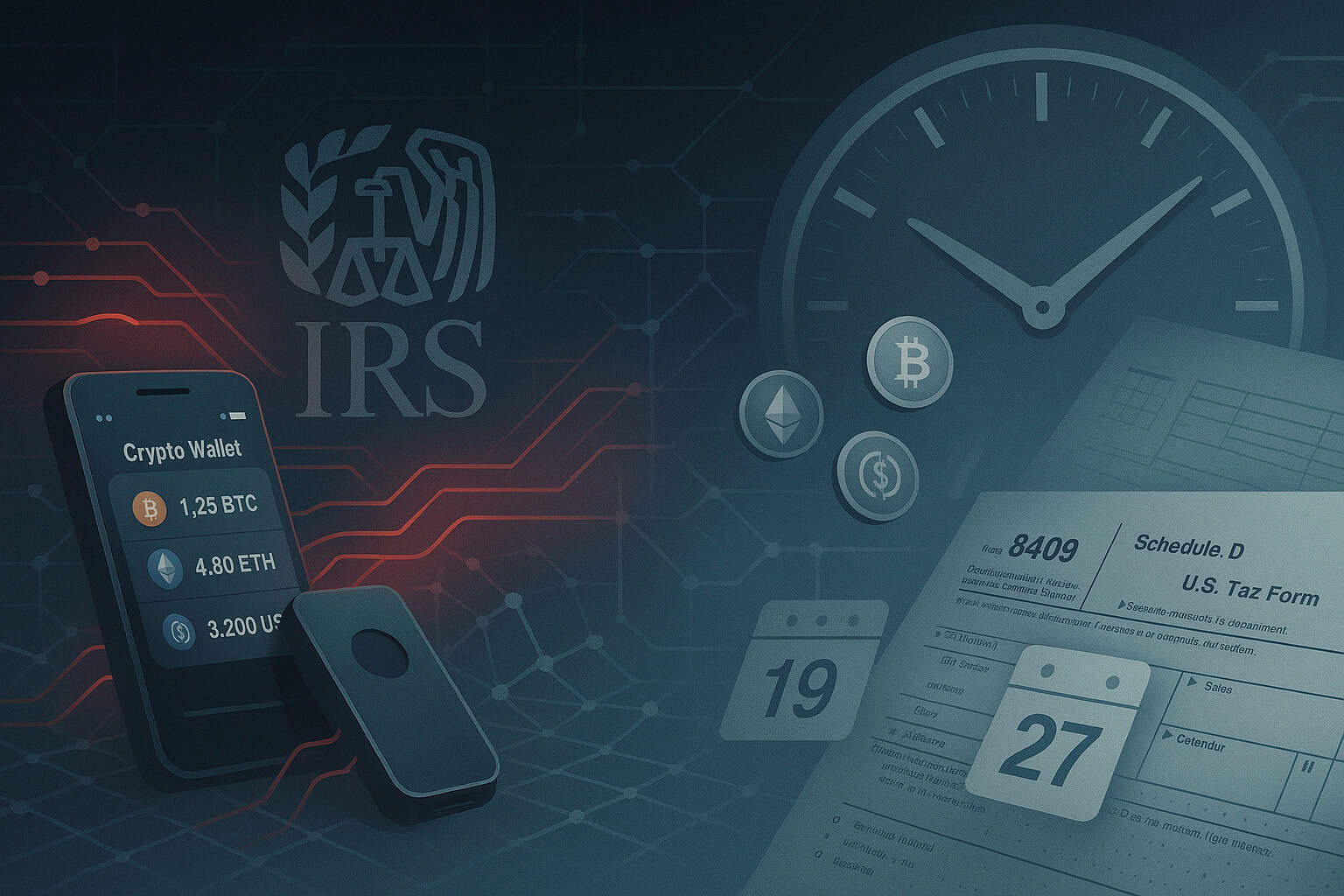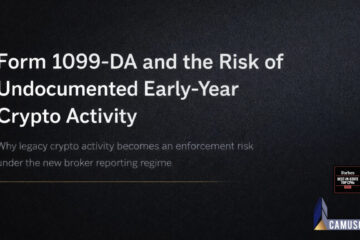Last Updated on September 25, 2025 by Patrick Camuso, CPA
The IRS has developed sophisticated methods to track crypto holdings and enforce tax laws, making it essential for taxpayers and other taxpayers to be aware of audit risks, penalties, and the time limits within which the IRS can assess additional tax or initiate collection actions.
Notably, once the IRS assesses income taxes after a return has been filed, it generally has 10 years from the date of assessment to collect the tax, including any associated penalties and interest.
Key Takeaways
- The IRS actively tracks cryptocurrency holdings and assesses audit risks for taxpayers.
- Taxpayers may face direct costs such as penalties, interest, and professional fees under IRS scrutiny.
- Indirect costs include time-consuming IRS correspondence and potential reputational impact.
- Complex transaction histories and prior non-compliance increase crypto tax costs.
- The IRS statute of limitations for audits is generally three years from the tax return’s filing or due date.
- If gross income is underreported by 25% or more, the statute extends to six years.
- No statute of limitations applies if a taxpayer files a fraudulent return, fails to file, or commits tax evasion.
- Best practices include timely filing, accurate reporting, and maintaining records for at least seven years.
- The IRS uses tools like John Doe summonses, international agreements, and Know Your Customer (KYC) rules to track crypto transactions.
- Audit risk increases with discrepancies, high transaction volumes, or failure to report taxable events.
- Collaborating with CPAs and maintaining transparent records helps reduce audit risk and navigate IRS processes effectively.
Tax Implications in the Digital Asset Landscape

In today’s evolving digital asset landscape, investors, NFT collectors, and Web3 entrepreneurs must understand that the law treats cryptocurrency transactions similarly to traditional assets. The IRS requires all taxable crypto transactions to be accurately reported on tax returns to avoid any additional tax obligations.
Failure to comply can result in penalties, interest, audits, and even face criminal charges in severe cases. The statute of limitations for criminal tax prosecution is six years, starting from the date the return was filed or from the last willful act that prevented filing. If a taxpayer fails to file a return altogether, the IRS can pursue collection indefinitely.
Cryptocurrency audits can be resource-intensive and stressful, even when taxpayers have professional CPA support. The IRS is intensifying scrutiny of digital asset transactions, making compliance with filing a tax return more crucial than ever.
Patrick Camuso, CPA: “Digital assets may feel anonymous, but on the blockchain, nothing truly disappears. The IRS has the tools to trace transactions back to individuals, so compliance isn’t optional.”
IRS Tracking of Cryptocurrency Transactions
Immutable Public Ledger
One of the fundamental reasons the IRS can effectively track cryptocurrency transactions is due to blockchain technology’s inherent transparency, although the statute of limitations varies based on different factors. Every transaction is permanently recorded on an immutable public ledger. While cryptocurrency wallets are pseudonymous, meaning they do not directly reveal the owner’s identity, they are not truly anonymous. The IRS and other agencies use advanced blockchain analytics to link wallet addresses to individuals.
Additionally, certain events can extend the IRS’s collection period. For example, if a taxpayer is out of the country for six consecutive months or more, the 10-year statute of limitations for federal taxes can be extended. The IRS can also suspend the collection period during appeals, bankruptcy proceedings, or military service, and taxpayers may also request an installment agreement. For instance, entering a combat zone suspends the Collection Statute Expiration Date (CSED) from the date of entry to the date of exit, plus an additional 180 days.
Tracking Tools
To enforce compliance, the IRS employs several tools and legal mechanisms to identify taxpayers underreporting or failing to report crypto income:
- John Doe Summons: This legal instrument compels cryptocurrency exchanges to disclose user data to the IRS. In 2023, for example, a major U.S. exchange was ordered to share transaction data for over 14,000 accounts, illustrating the IRS’s extensive reach.
- International Agreements (J5): The U.S. participates in international cooperation agreements that enable cross-border sharing of financial transaction data, helping the IRS track offshore crypto holdings.
- Centralized Exchange KYC: Know Your Customer (KYC) rules require exchanges to verify and report user identities, making it easier for the IRS to link transactions to taxpayers.
If the IRS finds missing tax returns, it may file a Substitute for Return (SFR) on the taxpayer’s behalf. This substitute return counts as an assessment, allowing the IRS to proceed with collection actions such as tax liens or wage garnishments based on the available information. These tools collectively enhance the IRS’s ability to assess tax accurately and pursue cases of tax evasion.
Statute of Limitation: Audit Risks and Compliance
Why Audits Happen
Audits often occur when the IRS detects discrepancies, such as mismatches between reported crypto transactions and filed returns, or when taxpayers have a high volume of transactions without corresponding taxable event reporting. Many taxpayers underestimate the importance of reporting all taxable crypto events, including sales, conversions, staking rewards, and airdrops. Failure to file a tax return leads to penalties that can accumulate up to 25% of the balance owed. Specifically, the penalty for not filing is 5% of the amount due per month. The longer unfiled returns remain outstanding, the more penalties and interest accrue.
Risk Reduction Strategies
To reduce audit risk and stay within the limitations related to tax enforcement, taxpayers should:
- Report every taxable event comprehensively and accurately.
- Maintain detailed records of wallet addresses, transaction histories, and estimated tax payments.
- File tax returns on time, as the limitations start from the return’s filing or due date.
IRS Notice 2014-21 provides foundational guidance for cryptocurrency taxation. Recent legislation, such as the Infrastructure Investment and Jobs Act, has expanded reporting requirements for brokers and certain digital asset transactions, increasing transparency.
The Costs of IRS Scrutiny
Direct Costs
Non-compliance with crypto tax laws can lead to significant direct costs, including:
- Penalties and interest on underpaid or unpaid taxes.
- Payment of back taxes resulting from adjusted returns after audits.
- Professional fees for CPAs and legal representation during audits, appeals, or litigation.
Indirect Costs
Beyond financial penalties, IRS scrutiny can cause:
- Time-consuming responses to IRS letters and inquiries.
- Stress and distraction from business or investment activities.
- Potential reputational damage, especially for entrepreneurs and public figures.
Factors Impacting Crypto Tax Costs
Several factors influence how much a taxpayer might owe or pay in penalties related to cryptocurrency taxes over five years:
- Complexity of Activity: Taxpayers with multiple wallets, exchanges, and numerous transactions face higher accounting and compliance costs.
- Prior Compliance History: Those with multiple years of non-compliance may face broader audit scopes and more intense IRS scrutiny.
- Severity of Discrepancies: If the IRS finds that a taxpayer has underreported gross income by 25% or more, the statute of limitations extends from the standard three years to six years, increasing exposure and potential penalties.
Statute of Limitations: How Long the IRS Can Audit You
Understanding the statute of limitations is crucial for taxpayers dealing with crypto tax matters. This time limit dictates how long the IRS has to review, audit, or assess additional taxes on filed returns. If you do not file a tax return, you lose the right to claim tax refunds after three years, impacting your overall tax debt situation, but the IRS can pursue collection indefinitely.
- Standard Period: The IRS generally has three years from the date a tax return is filed or its due date to initiate an audit or assessment.
- Extended Period: If the IRS finds that a taxpayer has substantially underreported income (by 25% or more), the limitations period extends to six years.
- No Limit: There is no statute of limitations if a taxpayer files a fraudulent return, fails to file a return, or commits tax evasion. In these cases, the IRS can assess taxes and pursue criminal penalties indefinitely.
Best practices include filing returns on time, even if you cannot pay in full, and keeping comprehensive records for at least seven years. Utilizing blockchain explorers and exporting transaction data in CSV format can help preserve crucial evidence in case of an IRS review.
Risk Mitigation Through Compliance
The most effective way to mitigate risks associated with cryptocurrency taxes is through transparent and accurate tax reporting. Working with experienced CPAs can help taxpayers prepare for potential disputes in tax court :
- Identify all taxable events related to their digital assets.
- Structure transactions to maximize tax efficiency within the bounds of the law.
- Implement compliant record-keeping systems that simplify audits or reviews.
Patrick Camuso, CPA, emphasizes, “Our job is to keep you ahead of the IRS. With proper planning, you can minimize taxes legally and avoid unnecessary audits.”
Frequently Asked Questions
What is the statute of limitations for cryptocurrency taxes?
The statute of limitations for cryptocurrency taxes generally follows the standard IRS rules. The IRS has three years from the date a tax return is filed or its due date to audit or assess additional taxes. However, if there is a substantial understatement of income (25% or more), this period extends to six years. If a return is fraudulent or not filed, there is no statute of limitations.
Can the IRS track my cryptocurrency transactions?
Yes, the IRS uses blockchain analytics, John Doe summonses, international agreements, and KYC requirements on exchanges to track cryptocurrency transactions and identify taxpayers who may have underreported or failed to report their crypto income.
What happens if I don’t file a tax return for my cryptocurrency earnings?
If you fail to file, the IRS can file a Substitute for Return (SFR) on your behalf, which often results in a higher tax liability as it does not account for deductions or credits. Penalties and interest will accrue, and the IRS can pursue collection actions indefinitely.
How long does the IRS have to collect unpaid cryptocurrency taxes?
Once the IRS assesses tax on returns not filed correctly , it generally has 10 years to collect the unpaid amount, including penalties and interest. Certain events, such as military service or appeals, can suspend or extend this collection period.
Can I reduce my audit risk related to cryptocurrency taxes?
Yes, maintaining accurate records of all crypto transactions, reporting all taxable events, making estimated tax payments, and filing tax returns on time are key strategies that most taxpayers should follow to reduce audit risk.
What should I do if I receive a letter or notice from the IRS about my cryptocurrency taxes?
Respond promptly and consider consulting a qualified CPA or tax attorney experienced in cryptocurrency tax matters. Ignoring IRS correspondence can lead to increased penalties, interest, and collection actions.
How long should I keep my cryptocurrency tax records?
It is recommended to keep records for at least seven years, as the IRS can audit returns within this period, especially if discrepancies or underreporting are suspected.
Can military service affect the IRS collection period for my crypto taxes?
Yes, military service can suspend the IRS’s Collection Statute Expiration Date (CSED) for the duration of service plus 270 days after notification to the IRS, effectively extending the time the IRS has to collect, which may sign additional obligation to collect taxes.
Protect Your Crypto Portfolio
Given the complexities and evolving nature of cryptocurrency taxation, proactive tax planning is essential. Scheduling a consultation with a knowledgeable CPA like Camuso CPA can help you:
- Review past filings for potential compliance gaps.
- Implement proactive tax strategies tailored to your crypto activities.
- Minimize audit risk and navigate the collection due process hearing if necessary.
Book Your Tax Strategy Session Today.
About Camuso CPA
Camuso CPA specializes in tax planning, accounting, and advisory services for digital asset investors and Web3 businesses. As one of the first firms to offer cryptocurrency tax services and accept crypto payments, Camuso CPA helps clients save through precise tax planning and compliance.
If you hold digital assets and want to meet your tax obligations while minimizing risks, working with tax professionals experienced in cryptocurrency is invaluable. They can assist with filing accurate tax returns, responding to IRS audits or appeals, and understanding when the statute of limitations starts for your tax year.
These experts can also help amend old tax returns, manage estimated tax payments, and reduce your overall tax liability. By proactively addressing these issues, you can avoid penalties, interest, and potential criminal charges related to tax evasion or fraudulent returns.
Voluntary disclosure programs are available to help taxpayers become compliant with IRS requirements for unfiled returns. Tax attorneys provide additional legal support for complex tax-related issues.
Understanding the statute of limitations on taxes and the Collection Statute Expiration Date (CSED) is essential. The CSED represents the time frame during which the IRS can collect assessed taxes. Certain events, such as military service, can suspend the CSED, extending the IRS’s collection period. Being informed about these limitations helps taxpayers plan their finances and avoid unexpected tax debt.






